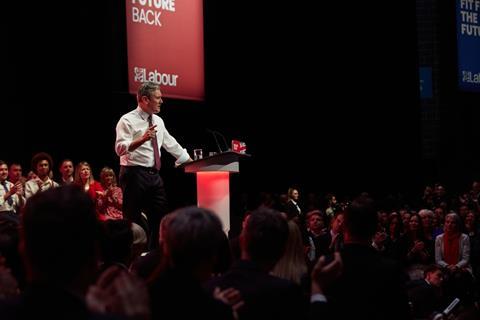Planning reforms and focus on infrastructure upgrades roundly backed by experts

The construction industry has broadly welcomed Labour’s election manifesto after the party confirmed its plans to build 1.5 million homes over the next five years and renew the country’s infrastructure.
The 125-page document, titled “Change”, outlined a series of sweeping planning reforms aiming to force local authorities to build more housing and reduce barriers to green energy schemes.

Billed as “a manifesto for wealth creation”, it also included a 10-year infrastructure strategy which the party said would see improved rail and road connectivity across the north of England.
Simon Peacock, head of regions at JLL, said it was “heartening to see Labour grab the bull by the horns and be so bold in its commitments to level up the UK’s economy”.
>> See also: Strong rhetoric on planning but no surprises as Keir Starmer launches Labour manifesto
“While finances might be tight and other issues generating more headlines, the need to drive real growth in the regions remains as important as ever. Take the power grid, for example, where the infrastructure currently in place has deterred investment and stymied growth for too long.”
Royal Institution of Chartered Surveyors chief executive Justin Young said Labour was right to identify planning reforms as a policy lever for boosting economic productivity.
“As well as speeding up decision-making, planning reform is needed for our housebuilding sector to function efficiently, which is needed if build targets are to be met,” Young said.
He added that the reforms could boost the number of SME housebuilders, which have fallen by 80% over the past 30 years.
“A simplification of the planning system – which is currently expensive to navigate and riddled with uncertainty – should help reverse this decline by delivering significant certainty,” he said.
National Housing Federation chief executive Kate Henderson warmly welcomed the manifesto’s measures to address the housing crisis and the proposed reintroduction of housing targets.
>> Read more: Poll shows strong shift in support towards Labour among ∫√…´œ»…˙TV readers
>> Read more: Looking for signs of construction swinging to Labour
>> Read more:
“We are encouraged to see a manifesto from the Labour party today that recognises the scale of the challenge we face,” she said, adding that it was encouraging to see the party “acknowledge that building on brownfield alone will not be enough to solve this crisis and that a more nuanced approach is required”.
“We know we will only be able to solve this crisis with a strategic, long term plan for housing that is nationally coordinated with measurable outcomes and goals,” she said.
“[The] manifesto makes clear that the Labour party share this belief in a long term approach, that looks holistically at the crisis and prioritises building more social housing, solving homelessness and overcrowding, providing warm homes, ensuring growth and improving affordability in its solutions.”
Pocket Living managing director Paul Rickard said the manifesto seemed to be a “genuine attempt at starting that difficult and long overdue process” of planning reform.
He also urged Labour to be “radical in their approach” to granting a presumption in favour of development on brownfield sites provided affordable housing requirements are met.
Turley planning director Tim Burden called on the party to address current public perceptions of the green belt to support more development in “places that need it”.
“There’s a widespread misunderstanding of what the role of the Green Belt is amongst the public and arguably our politicians,” he said.
“This has created significant political challenges when any real change to the Green Belt is proposed and we end up going round in circles with no real progress made.”
At-a-glance: the key measures for construction in the Labour manifesto
- build 1.5 million new homes over the next parliament
- re-instate mandatory housing targets, strengthen presumptions in favour of sustainable development and fund additional planning officers, paid for by increasing the rate of the stamp duty surcharge paid by non-UK residents
- prioritise the release of supposedly lower quality “grey belt” land
- build a new generation of new towns and to reform compulsory purchase compensation rules relating to hope value
- new planning powers and housing grant funding flexibilities for combined authorities
- make changes to the Affordable Homes Programme “to ensure that it delivers more homes from existing funding”
- establish an Industrial Strategy Council
- a £7.3bn National Wealth Fund to be tasked with supporting Labour’s growth and clean energy missions
- develop a 10-year infrastructure strategy
- update national planning policy to make it easier to build laboratories, digital infrastructure and gigafactories
- invest an extra £6.6bn as part of its Warm Homes Plan to upgrade five million homes
British Property Federation chief executive Melanie Leech said the manifesto’s focus on strategic planning at a national or regional level instead of locally would make it easier to hit housing targets.
“Measures to ensure up-to-date local plans are in place and a new approach to ‘grey belt’ land are also welcome, as is the commitment to more local authority planners so that existing projects can be unblocked, and local authorities are better able to engage with our sector to provide for future needs.”
Meanwhile, Labour’s pledge to boost economic growth by unlocking more infrastructure improvements was welcomed by Civil Engineering Contractors Association chief executive Alasdair Reisner.
“It is gratifying that the Labour Party has recognised that the best means of delivering economic growth is through infrastructure delivery, planning reform, and unlocking shovel-ready schemes in all parts of the UK,” he said.
“The Labour Party’s commitment to placing infrastructure at the heart of government decision-making, delivering a long-term transport strategy, and rolling out much-needed planning reforms all reflect CECA’s policy recommendations to an incoming government closely,” he said.
Election focus

With the UK set for a general election on 4 July, the country is facing some serious problems.
Low growth, flatlining productivity, question marks over net zero funding and capability, skills shortages and a worsening housing crisis all amount to a daunting in-tray for the next government.
This year’s general election therefore has very high stakes for the built environment and the economy as a whole. For this reason,
∫√…´œ»…˙TV‚Äôs election coverage aims to help the industry understand the issues and amplify construction‚Äôs voice so that the parties hears it loud and clear.



























No comments yet